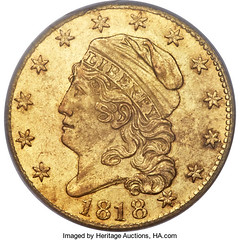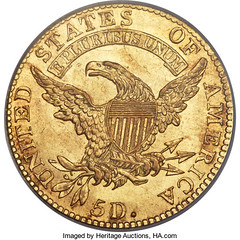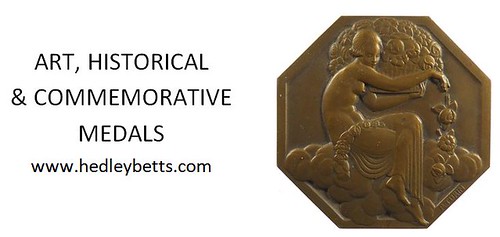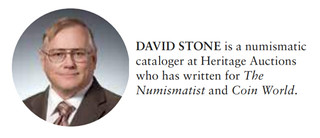
PREV ARTICLE
NEXT ARTICLE
FULL ISSUE
PREV FULL ISSUE
THE 1818 “I OVER 0” REVERSE HALF EAGLEAn article by David Stone in the Winter 2017-2018 issue of the Heritage Auctions Intelligent Collector highlights an interesting half eagle die variety. -Editor
  Die varieties of early U.S. Half Eagles have been studied intently by some of the most respected numismatic researchers of all time. By the early 1880s, John W. Haseltine and John Colvin Randall began systematically classifying early Half Eagles by noting the tiny differences in the punches used to impress the design elements into the dies, and the different placement of the design elements in relation to each other. Their work was refined and expanded in the early 20th century by Edgar Adams, William Woodin and Waldo Newcomer. More recently, scholars like Walter Breen, Harry Bass and John Dannreuther added their findings to the accumulated knowledge of early gold die varieties. Last March, Heritage Auctions numismatist John W. Sculley joined this distinguished group by correctly identifying the overpunched denomination seen on the reverse of some rare 1818 and 1819 Capped Head Left Half Eagles. The dramatic overpunched reverse was first used to strike a very scarce variety of the 1818 Half Eagle (called BD-3 in John Dannreuther’s Early U.S. Gold Coin Varieties) and employed again to strike the even more elusive BD-1 variety in 1819. The blundered denomination was actually noticed at an early date, but its true nature was always misunderstood. H.P. Smith and David Proskey were the first numismatists to describe the blundered denomination in print in their description of the coin in lot 904 of their catalog of the Lorin G. Parmelee Collection (New York Coin & Stamp, June 1890): “1818. Lot 904 Half Eagle: D. in value has been cut over ‘0’: fine sharp impression: minute nicks; very fine.” The reverse die became known as the famous “5D over 50” reverse in all standard series references and any student of the early Half Eagle series would recognize the nomenclature today, but the real alteration is something quite different.
“My take is that the die-sinker originally used the O punch instead of the D. To correct the mistake, he just used the I punch to add in the stem of the D, instead of trying to make the D punch work – which would most likely have caused some messy doubling. Quite a clever fix that saved them from scrapping the entire die.”
 Wayne Homren, Editor The Numismatic Bibliomania Society is a non-profit organization promoting numismatic literature. See our web site at coinbooks.org. To submit items for publication in The E-Sylum, write to the Editor at this address: whomren@gmail.com To subscribe go to: https://my.binhost.com/lists/listinfo/esylum All Rights Reserved. NBS Home Page Contact the NBS webmaster 
|

